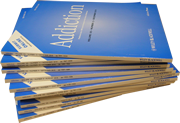Ny artikel baserad på ÖPP-data reder ut hur programmet verkar
Tillsammans med Dr. Özdemir på Örebro universitet har vi fått en artikel publicerad i den vetenskapliga tidskriften ADDICTION. I artikeln bekräftas med avancerade statistiska metoder de teoretiska fundamenten bakom EFFEKT-programmen: Att fokusera på föräldrars tydliga förväntningar är en effektiv och robust strategi för att förebygga.

Ref: Özdemir, M., & Koutakis, N. (2016). Does promoting parents’ negative attitudes to underage drinking reduce adolescents’ drinking? The mediating process and moderators of the effects of the Örebro Prevention Programme. Addiction, 111, 263–271.
Aims. To test the mediating role of parents’ restrictive attitudes to underage drinking in explaining the effectiveness of the Orebro Prevention Program (OPP), a brief intervention targeting heavy drinking among youths, and the moderators of the intervention effect.
Design. A quasi-experimental matched-control group study with assessments at baseline, and at 18-, and 30-month follow-ups.
Participants. Of the 895 target youths at ages 12-13, 811 youths and 651 parents at baseline, 653 youths and 524 parents at 18-month, and 705 youths and 506 parents at 30-month follow-up participated in the study.
Measurements. Youths reported on their past month drunkenness, their parents’ and peers’ alcohol use, and the quality of their relationship with parents. Parents reported on their attitudes to underage drinking at baseline, 18-, and 30-month follow-ups. Demographic information were obtained at pre-test.
Findings. The mediation analyses showed that changes in parents’ restrictive attitudes to underage drinking explained the impact of the program on changes in youth drunkenness (βindirect =–.152, p<.001), which was reduced, and onset of monthly drunkenness (βindirect =–.094, p=.025), which was delayed, relative to controls. Mediation effect explained 57% and 45% of the effects on drunkenness and onset of monthly drunkenness, respectively. The program effects on both parents’ attitudes and youth drunkenness were similar across gender, immigrant status, parents’ and peers’ alcohol use, and parent-youth relationship quality.
Conclusions. Targeting parents’ restrictive attitudes to youth drinking proved to be an effective and robust strategy for reducing heavy underage drinking, even across different conditions.
Kontakta oss
Epost: info@effekt.org Telefon: +46(0)739815362Adress: Novahuset, Studiegatan 1, S-70182 ÖREBRO

